| Listing 1 - 9 of 9 |
Sort by
|
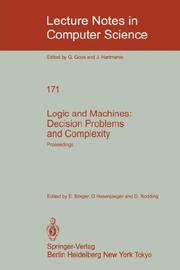
ISBN: 3540133313 9783540133315 0387133313 9780387133317 3540388567 Year: 1984 Volume: vol 171 Publisher: Berlin New York Springer
Abstract | Keywords | Export | Availability | Bookmark
 Loading...
Loading...Choose an application
- Reference Manager
- EndNote
- RefWorks (Direct export to RefWorks)
Computer science --- Mathematical logic --- 681.3*F13 --- 681.3*G21 --- Complexity classes: complexity hierarchies; machine-independent complexity; reducibility and completeness; relations among complexity classes; relations among complexity measures (Computation by abstract devices)--See also {681.3*F2} --- Combinatorics: combinatorial algorithms; counting problems; generating functions; permutations and combinations; recurrences and difference equations --- Machine theory --- Computational complexity --- Decision making --- Automates mathématiques, Théorie des --- Complexité de calcul (Informatique) --- Prise de décision --- 681.3*G21 Combinatorics: combinatorial algorithms; counting problems; generating functions; permutations and combinations; recurrences and difference equations --- 681.3*F13 Complexity classes: complexity hierarchies; machine-independent complexity; reducibility and completeness; relations among complexity classes; relations among complexity measures (Computation by abstract devices)--See also {681.3*F2} --- Machine theory - Congresses. --- Computational complexity - Congresses. --- Decision-making - Congresses. --- Mathematics. --- Computer science. --- Logic, Symbolic and mathematical. --- Mathematics, general. --- Computation by Abstract Devices. --- Mathematical Logic and Formal Languages. --- Mathematical Logic and Foundations. --- Algebra of logic --- Logic, Universal --- Symbolic and mathematical logic --- Symbolic logic --- Mathematics --- Algebra, Abstract --- Metamathematics --- Set theory --- Syllogism --- Informatics --- Science --- Math
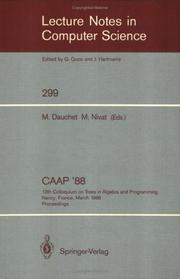
ISBN: 354019021X 354038930X Year: 1988 Volume: vol 299 Publisher: Berlin Heidelberg New York Springer
Abstract | Keywords | Export | Availability | Bookmark
 Loading...
Loading...Choose an application
- Reference Manager
- EndNote
- RefWorks (Direct export to RefWorks)
This volume contains the proceedings of the 13th Colloquium on Trees in Algebra and Programming (CAAP '88), held in Nancy, March 21-24, 1988. The preceding 12 colloquia were held in France, Italy and Germany. CAAP '85 and CAAP '87 were integrated into the International Joint Conference on Theory and Practice of Software Development, TAPSOFT (see Lecture Notes in Computer Science volumes 185 and 249). As another effort to link theory and practice in computer science, CAAP '88 was held in conjunction with the European Symposium on Programming, ESOP '88 (see volume 300 of this Lecture Notes series). CAAP '88 is a conference in the area of program development and programming concepts but, following the tradition, is devoted to theoretical aspects, and especially to Trees, a basic structure of computer science. A wider range of topics in theoretical computer science is also covered. The papers are on word, tree or graph languages, with algorithmic or complexity studies, on abstract data types (another classical topic of CAAP) and/or term rewriting systems and on non-standard logics, and parallelism and concurrency.
Computer science --- 681.3*D2 --- 681.3*F12 --- 681.3*F13 --- 681.3*F4 --- 681.3*I1 --- Software engineering: protection mechanisms; standards--See also {681.3*K63}; {681.3*K51} --- Modes of computation: alternation and nondeterminism; parallelism; probabilistic computation; relations among modes; relativized computation --- Complexity classes: complexity hierarchies; machine-independent complexity; reducibility and completeness; relations among complexity classes; relations among complexity measures (Computation by abstract devices)--See also {681.3*F2} --- Mathematical logic and formal languages (Theory of computation) --- Algebraic manipulation (Computing methodologies) --- 681.3*I1 Algebraic manipulation (Computing methodologies) --- 681.3*F4 Mathematical logic and formal languages (Theory of computation) --- 681.3*F13 Complexity classes: complexity hierarchies; machine-independent complexity; reducibility and completeness; relations among complexity classes; relations among complexity measures (Computation by abstract devices)--See also {681.3*F2} --- 681.3*F12 Modes of computation: alternation and nondeterminism; parallelism; probabilistic computation; relations among modes; relativized computation --- 681.3*D2 Software engineering: protection mechanisms; standards--See also {681.3*K63}; {681.3*K51} --- Information theory. --- Computer science. --- Theory of Computation. --- Computation by Abstract Devices. --- Informatics --- Science --- Communication theory --- Communication --- Cybernetics
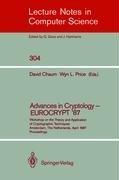
ISBN: 354019102X 038719102X Year: 1988 Volume: 304 Publisher: Berlin New York Heidelberg Springer
Abstract | Keywords | Export | Availability | Bookmark
 Loading...
Loading...Choose an application
- Reference Manager
- EndNote
- RefWorks (Direct export to RefWorks)
cryptografie --- cryptologie --- Computer. Automation --- Computers --- Cryptography --- Ordinateurs --- Cryptographie --- Access control --- Congresses --- Accès --- Contrôle --- Congrès --- 681.3*H2 --- 681.3*D46 --- 681.3*E3 --- 681.3*F13 --- 681.3*F21 --- Database management: security; integrity; protection--See also {?681.5*E5} --- Security and protection: access controls; authentication; cryptographic controls; information flow controls; security kernels; verification (Operating systems) --- Data encryption: data encryption standard; DES; public key cryptosystems --- Complexity classes: complexity hierarchies; machine-independent complexity; reducibility and completeness; relations among complexity classes; relations among complexity measures (Computation by abstract devices)--See also {681.3*F2} --- Numerical algorithms and problems: computation of transforms; computations infinite fields; computations on matrices; computations on polynomials; numer-theoretic computations--See also {681.3*G1}; {681.3*G4}; {681.3*I1} --- 681.3*F21 Numerical algorithms and problems: computation of transforms; computations infinite fields; computations on matrices; computations on polynomials; numer-theoretic computations--See also {681.3*G1}; {681.3*G4}; {681.3*I1} --- 681.3*F13 Complexity classes: complexity hierarchies; machine-independent complexity; reducibility and completeness; relations among complexity classes; relations among complexity measures (Computation by abstract devices)--See also {681.3*F2} --- 681.3*E3 Data encryption: data encryption standard; DES; public key cryptosystems --- 681.3*D46 Security and protection: access controls; authentication; cryptographic controls; information flow controls; security kernels; verification (Operating systems) --- 681.3*H2 Database management: security; integrity; protection--See also {?681.5*E5} --- Accès --- Contrôle --- Congrès --- Computers.

ISBN: 0262022788 9780262255844 9780262524117 9780262022781 Year: 1988 Volume: vol *5 Publisher: Cambridge: MIT Press,
Abstract | Keywords | Export | Availability | Bookmark
 Loading...
Loading...Choose an application
- Reference Manager
- EndNote
- RefWorks (Direct export to RefWorks)
Algorithmes --- Algorithms --- Algoritmen --- Computer graphics --- Computergrafiek --- Infographie --- Computer algorithms --- Computer programming --- 681.3*F13 --- 681.3*F2 --- 681.3*F31 --- 681.3*I3 --- Computers --- Electronic computer programming --- Electronic data processing --- Electronic digital computers --- Programming (Electronic computers) --- Coding theory --- Automatic drafting --- Graphic data processing --- Graphics, Computer --- Computer art --- Graphic arts --- Engineering graphics --- Image processing --- Complexity classes: complexity hierarchies; machine-independent complexity; reducibility and completeness; relations among complexity classes; relations among complexity measures (Computation by abstract devices)--See also {681.3*F2} --- Analysis of algorithms and problem complexity--See also {681.3*B6}; {681.3*B7}; {681.3*F13} --- Specifying anf verifying and reasoning about programs: assertions; invariants; mechanical verification; pre- and post-conditions (Logics and meanings of programs)--See also {681.3*D21}; {681.3*D24}; {681.3*D31}; {681.3*E1} --- Computer graphics (Computing methodologies) --- Programming --- Digital techniques --- Computer programming. --- Computer algorithms. --- Computer graphics. --- 681.3*I3 Computer graphics (Computing methodologies) --- 681.3*F31 Specifying anf verifying and reasoning about programs: assertions; invariants; mechanical verification; pre- and post-conditions (Logics and meanings of programs)--See also {681.3*D21}; {681.3*D24}; {681.3*D31}; {681.3*E1} --- 681.3*F2 Analysis of algorithms and problem complexity--See also {681.3*B6}; {681.3*B7}; {681.3*F13} --- 681.3*F13 Complexity classes: complexity hierarchies; machine-independent complexity; reducibility and completeness; relations among complexity classes; relations among complexity measures (Computation by abstract devices)--See also {681.3*F2} --- Electronic digital computers - Programming. --- Algorithms. --- Program Behavior --- Computer Aided Education --- Algorithm --- Vision --- Graphics
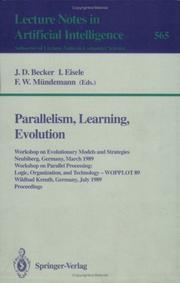
ISBN: 0387550275 3540550275 3540466630 Year: 1991 Volume: vol 565 vol *59 Publisher: Berlin New York Springer-Verlag
Abstract | Keywords | Export | Availability | Bookmark
 Loading...
Loading...Choose an application
- Reference Manager
- EndNote
- RefWorks (Direct export to RefWorks)
This volume presents the proceedings of a workshop on evolutionary models and strategies and another workshop on parallel processing, logic, organization, and technology, both held in Germany in 1989. In the search for new concepts relevant for parallel and distributed processing, the workshop on parallel processing included papers on aspects of space and time, representations of systems, non-Boolean logics, metrics, dynamics and structure, and superposition and uncertainties. The point was stressed that distributed representations of information may share features with quantum physics, such as the superposition principle and the uncertainty relations. Much of the volume contains material on general parallel processing machines, neural networks, and system-theoretic aspects. The material on evolutionary strategies is included because these strategies will yield important and powerful applications for parallel processing machines, and open the wayto new problem classes to be treated by computers.
Parallel processing (Electronic computers) --- -681.3*C1 --- 681.3*F13 --- 681.3*I26 --- Congresses --- Processor architectures (Computer systems organization) --- Complexity classes: complexity hierarchies; machine-independent complexity; reducibility and completeness; relations among complexity classes; relations among complexity measures (Computation by abstract devices)--See also {681.3*F2} --- Learning: analogies; concept learning; induction; knowledge acquisition; language acquisition; parameter learning (Artificial intelligence)--See also {681.3*K32} --- 681.3*I26 Learning: analogies; concept learning; induction; knowledge acquisition; language acquisition; parameter learning (Artificial intelligence)--See also {681.3*K32} --- 681.3*F13 Complexity classes: complexity hierarchies; machine-independent complexity; reducibility and completeness; relations among complexity classes; relations among complexity measures (Computation by abstract devices)--See also {681.3*F2} --- 681.3*C1 Processor architectures (Computer systems organization) --- 681.3*C1 --- Architecture, Computer. --- Artificial intelligence. --- Microprocessors. --- Mathematical logic. --- Computers. --- Quantum computers. --- Spintronics. --- Computer System Implementation. --- Artificial Intelligence. --- Processor Architectures. --- Mathematical Logic and Formal Languages. --- Computation by Abstract Devices. --- Quantum Information Technology, Spintronics. --- Computers --- Automatic computers --- Automatic data processors --- Computer hardware --- Computing machines (Computers) --- Electronic brains --- Electronic calculating-machines --- Electronic computers --- Hardware, Computer --- Computer systems --- Cybernetics --- Machine theory --- Calculators --- Cyberspace --- Algebra of logic --- Logic, Universal --- Mathematical logic --- Symbolic and mathematical logic --- Symbolic logic --- Mathematics --- Algebra, Abstract --- Metamathematics --- Set theory --- Syllogism --- Magnetoelectronics --- Spin electronics --- Microelectronics --- Nanotechnology --- Minicomputers --- AI (Artificial intelligence) --- Artificial thinking --- Intellectronics --- Intelligence, Artificial --- Intelligent machines --- Machine intelligence --- Thinking, Artificial --- Bionics --- Cognitive science --- Digital computer simulation --- Electronic data processing --- Logic machines --- Self-organizing systems --- Simulation methods --- Fifth generation computers --- Neural computers --- Architecture, Computer
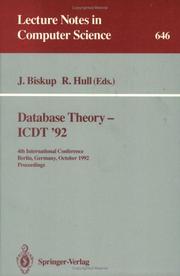
ISBN: 0387560394 3540560394 Year: 1992 Volume: 646 Publisher: Berlin London Tokyo Springer Verlag
Abstract | Keywords | Export | Availability | Bookmark
 Loading...
Loading...Choose an application
- Reference Manager
- EndNote
- RefWorks (Direct export to RefWorks)
681.3*H2 --- Database management --- 681.3*F13 --- 681.3*F41 --- 681.3*I2 --- Database management: security; integrity; protection--See also {?681.5*E5} --- Congresses. --- Complexity classes: complexity hierarchies; machine-independent complexity; reducibility and completeness; relations among complexity classes; relations among complexity measures (Computation by abstract devices)--See also {681.3*F2} --- Mathematical logic: computability theory; computational logic; lambda calculus; logic programming; mechanical theorem proving; model theory; proof theory;recursive function theory--See also {681.3*F11}; {681.3*I22}; {681.3*I23} --- Artificial intelligence. AI --- 681.3*I2 Artificial intelligence. AI --- 681.3*F41 Mathematical logic: computability theory; computational logic; lambda calculus; logic programming; mechanical theorem proving; model theory; proof theory;recursive function theory--See also {681.3*F11}; {681.3*I22}; {681.3*I23} --- 681.3*F13 Complexity classes: complexity hierarchies; machine-independent complexity; reducibility and completeness; relations among complexity classes; relations among complexity measures (Computation by abstract devices)--See also {681.3*F2} --- 681.3*H2 Database management: security; integrity; protection--See also {?681.5*E5} --- Bases de données --- Congresses --- Gestion --- Congrès --- Databases.
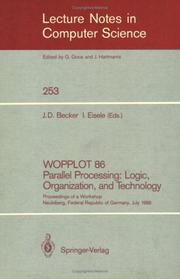
ISBN: 3540180222 0387180222 3540477098 Year: 1986 Volume: vol 253 Publisher: Berlin New York Paris Springer
Abstract | Keywords | Export | Availability | Bookmark
 Loading...
Loading...Choose an application
- Reference Manager
- EndNote
- RefWorks (Direct export to RefWorks)
WOPPLOT 86 - Workshop on Parallel Processing: Logic, Organization and Technology - gathered together experts from various fields for a broad overview of current trends in parallel processing. There are contributions from logic (e.g., the connection between time and logic, or non-monotonic reasoning); from organizational structure theory (of great importance for pyramid architecture) and structure representation; from intrinsic parallelism and problem classification; from developments in future technologies (3-D Silicon technology, molecular electronics); and from various applications (pattern storage in adaptive memories, simulation of physical systems). The proceedings show clearly that progress in parallel processing is an interdisciplinary goal; they present a cross section of the state of the art as well as of future trends. Furthermore, some contributions (in particular, those from logic and organization) deserve a broader interest also outside the field of parallel processing.
681.3*B71 --- 681.3*C1 --- Types and design styles: algorithms implemented in hardware; gate arrays; inpput/output circuits; microprocessors and microcomputers; standard cells; VLSI; memory technologies (Integrated circuits) --- Processor architectures (Computer systems organization) --- Complexity classes: complexity hierarchies; machine-independent complexity; reducibility and completeness; relations among complexity classes; relations among complexity measures (Computation by abstract devices)--See also {681.3*F2} --- Deduction and theorem proving: answer/reason extraction; reasoning; resolution; metatheory; mathematical induction; logic programming (Artificial intelligence) --- 681.3*I23 Deduction and theorem proving: answer/reason extraction; reasoning; resolution; metatheory; mathematical induction; logic programming (Artificial intelligence) --- 681.3*F13 Complexity classes: complexity hierarchies; machine-independent complexity; reducibility and completeness; relations among complexity classes; relations among complexity measures (Computation by abstract devices)--See also {681.3*F2} --- 681.3*C1 Processor architectures (Computer systems organization) --- 681.3*B71 Types and design styles: algorithms implemented in hardware; gate arrays; inpput/output circuits; microprocessors and microcomputers; standard cells; VLSI; memory technologies (Integrated circuits) --- Computer architecture. Operating systems --- 681.3*F13 --- 681.3*I23 --- Computer science. --- Processor Architectures. --- Informatics --- Science --- Parallel processing (Electronic computers)
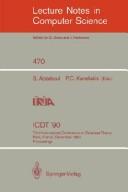
ISBN: 0387535071 3540535071 3540466827 Year: 1990 Volume: vol 470 Publisher: Berlin Heidelberg New York Springer
Abstract | Keywords | Export | Availability | Bookmark
 Loading...
Loading...Choose an application
- Reference Manager
- EndNote
- RefWorks (Direct export to RefWorks)
The emergence of new paradigms for data management raises a variety of exciting challenges. An important goal of database theory is to answer these challenges by providing sound foundations for the development of the field. This volume contains the papers selected for the third International Conference on Database Theory, ICDT'90. The conferences in this series are held biannually in beautiful European cities, Rome in 1986 and Bruges in 1988 with proceedings published as volumes 234 and 326 in the same series. ICDT'90 was organized in Paris by the Institut National de Recherche en Informatique et Automatique. The conference features 2 invited presentations and 31 papers selected from 129 submissions. The papers describe original ideas and new results on the foundations of databases, knowledge bases, object-oriented databases, relational theory, transaction management, data structures and deductive databases. The volume offers a good overview of the state of the art and the current trends in database theory. It should be a valuable source of information for researchers interested in the field.
681.3*H2 --- Database management --- 681.3*D33 --- 681.3*E2 --- 681.3*F13 --- 681.3*I24 --- Database management: security; integrity; protection--See also {?681.5*E5} --- Congresses. --- Languages constructs: abstract data types; concurrent programming structures;control structures; coroutines (Programming languages) --- Data storage representations: composite structures; contiguous representations; hash-table representations; linked representations; primitive data items --- Complexity classes: complexity hierarchies; machine-independent complexity; reducibility and completeness; relations among complexity classes; relations among complexity measures (Computation by abstract devices)--See also {681.3*F2} --- Knowledge representation formalisms and methods: frames and scripts; predicate logic; relation systems; representation languages; procedural and rule-based representations; semantic networks (Artificial intelligence) --- 681.3*I24 Knowledge representation formalisms and methods: frames and scripts; predicate logic; relation systems; representation languages; procedural and rule-based representations; semantic networks (Artificial intelligence) --- 681.3*F13 Complexity classes: complexity hierarchies; machine-independent complexity; reducibility and completeness; relations among complexity classes; relations among complexity measures (Computation by abstract devices)--See also {681.3*F2} --- 681.3*E2 Data storage representations: composite structures; contiguous representations; hash-table representations; linked representations; primitive data items --- 681.3*D33 Languages constructs: abstract data types; concurrent programming structures;control structures; coroutines (Programming languages) --- 681.3*H2 Database management: security; integrity; protection--See also {?681.5*E5} --- Congresses --- Data structures (Computer scienc. --- Computer science. --- Database management. --- Artificial intelligence. --- Data Structures and Information Theory. --- Programming Techniques. --- Database Management. --- Data Storage Representation. --- Artificial Intelligence. --- Programming Languages, Compilers, Interpreters. --- AI (Artificial intelligence) --- Artificial thinking --- Electronic brains --- Intellectronics --- Intelligence, Artificial --- Intelligent machines --- Machine intelligence --- Thinking, Artificial --- Bionics --- Cognitive science --- Digital computer simulation --- Electronic data processing --- Logic machines --- Machine theory --- Self-organizing systems --- Simulation methods --- Fifth generation computers --- Neural computers --- Data base management --- Data services (Database management) --- Database management services --- DBMS (Computer science) --- Generalized data management systems --- Services, Database management --- Systems, Database management --- Systems, Generalized database management --- Informatics --- Science --- Databases.
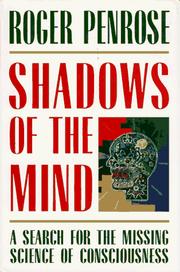
ISBN: 0198539789 0099582112 9780198539780 Year: 1995 Publisher: Oxford: Oxford university press,
Abstract | Keywords | Export | Availability | Bookmark
 Loading...
Loading...Choose an application
- Reference Manager
- EndNote
- RefWorks (Direct export to RefWorks)
A New York Times bestseller when it appeared in 1989, Roger Penrose's The Emperor's New Mind was universally hailed as a marvelous survey of modern physics as well as a brilliant reflection on the human mind, offering a new perspective on the scientific landscape and a visionary glimpse of the possible future of science. Now, in Shadows of the Mind, Penrose offers another exhilarating look at modern science as he mounts an even more powerful attack on artificial intelligence. But perhaps more important, in this volume he points the way to a new science, one that may eventually explain the physical basis of the human mind. Penrose contends that some aspects of the human mind lie beyond computation. This is not a religious argument (that the mind is something other than physical) nor is it based on the brain's vast complexity (the weather is immensely complex, says Penrose, but it is still a computable thing, at least in theory). Instead, he provides powerful arguments to support his conclusion that there is something in the conscious activity of the brain that transcends computation--and will find no explanation in terms of present-day science. To illuminate what he believes this "something" might be, and to suggest where a new physics must proceed so that we may understand it, Penrose cuts a wide swathe through modern science, providing penetrating looks at everything from Turing computability and Godel's incompleteness, via Schrodinger's Cat and the Elitzur-Vaidman bomb-testing problem, to detailed microbiology. Of particular interest is Penrose's extensive examination of quantum mechanics, which introduces some new ideas that differ markedly from those advanced in The Emperor's New Mind, especially concerning the mysterious interface where classical and quantum physics meet. But perhaps the most interesting wrinkle in Shadows of the Mind is Penrose's excursion into microbiology, where he examines cytoskeletons and microtubules, minute substructures lying de
Artificial intelligence --- Thought and thinking --- Gödel's theorem --- Quantum theory --- Physics --- Philosophy --- Gödel [Theorema van ] --- Gödel [Théorème de ] --- Gödel, Théorème de --- Godel's theorem --- Gödel's incompleteness theorem --- Undecidable theories --- Incompleteness theorems --- Decidability (Mathematical logic) --- Gödel's theorem. --- Gödel's theorem --- Gödel, Théorème de --- 510.21 --- 681.3*I2 --- 681.3*I2 Artificial intelligence. AI --- Artificial intelligence. AI --- Mind --- Thinking --- Thoughts --- Educational psychology --- Psychology --- Intellect --- Logic --- Perception --- Psycholinguistics --- Self --- 510.21 General philosophical considerations. Critical aspects. Logical antinomies --- General philosophical considerations. Critical aspects. Logical antinomies --- Quantum dynamics --- Quantum mechanics --- Quantum physics --- Mechanics --- Thermodynamics --- Arithmetic --- Completeness theorem --- Logic, Symbolic and mathematical --- Number theory --- AI (Artificial intelligence) --- Artificial thinking --- Electronic brains --- Intellectronics --- Intelligence, Artificial --- Intelligent machines --- Machine intelligence --- Thinking, Artificial --- Bionics --- Cognitive science --- Digital computer simulation --- Electronic data processing --- Logic machines --- Machine theory --- Self-organizing systems --- Simulation methods --- Fifth generation computers --- Neural computers --- Foundations --- Cognitive psychology --- Artificial intelligence. --- Intelligence artificielle --- Physique --- Théorie quantique --- Pensée --- Philosophie --- Quantum theory. --- Thought and thinking. --- Philosophy. --- Gèodel's theorem. --- Consciousness --- Conscience --- Pensée --- Théorie quantique --- Conscience. --- Intelligence artificielle. --- Pensée. --- Gödel, Théorème de. --- Théorie quantique. --- Philosophie. --- Physics - Philosophy --- Pensée. --- Gödel, Théorème de.
| Listing 1 - 9 of 9 |
Sort by
|

 Search
Search Feedback
Feedback About UniCat
About UniCat  Help
Help News
News